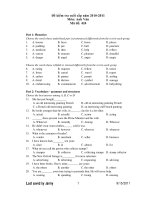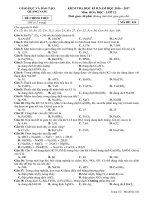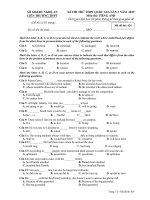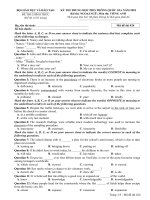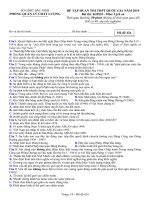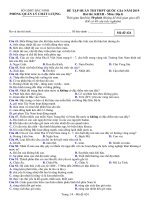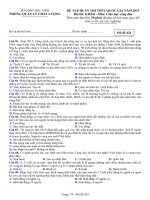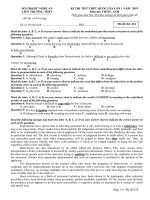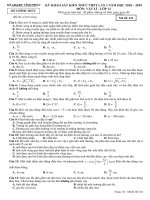De 424 d1489 5966
Bạn đang xem bản rút gọn của tài liệu. Xem và tải ngay bản đầy đủ của tài liệu tại đây (150.76 KB, 4 trang )
SỞ GD & ĐT QUẢNG TRỊ
HỘI ĐỒNG BỘ MÔN TIẾNG ANH
ĐỀ THI THỬ TỐT NGHIỆP THPT NĂM 2023
MÔN TIẾNG ANH
Thời gian làm bài : 60 Phút; (Đề có 50 câu)
ĐỀ THI THỬ
(Đề có 5 trang)
Họ tên : ............................................................... Lớp : ...................
Mã đề 424
Mark the letter A, B, C, or D on your answer sheet to indicate the word whose underlined part differs
from the other three in pronunciation in each of the following questions.
Question 1: [BDT]
A. thank
B. though
C. thought
D. thief
Question 2: [CLV]
A. spell
B. neck
C. dwell
D. germ
Mark the letter A, B, C, or D on your answer sheet to indicate the word that differs from the other three in
the position of primary stress in each of the following questions.
Question 3: [TL]
A. clutter
B. figure
C. drama
D. disease
Question 4: [TLH]
A. ambition
B. dishwasher
C. malfunction
D. barista
Mark the letter A, B, C, or D on your answer sheet to indicate the sentence that best completes each of
the following exchanges.
Question 5: [CL] "Your hairstyle is terrific. Mary?"." ....................”
A. Thanks, but I'm afraid.
B. Thanks, Cindy, I had it done last night .
C. Never mention it.
D. Yes, all right.
Question 6: [CL] Tom: “I think married women should not go to work.”
Cindy: “.................... it’s too boring to be housewives all their lives”.
A. I can’t agree with you more
B. That’s right
C. Perhaps, I’m not sure
D. I don’t agree
Mark the letter A, B, C, or D on your answer sheet to indicate the underlined part that needs correction in
each of the following questions.
Question 7: [HDBM] Most children have access to adequate health care and can expect to live longer than
its parents.
A. its
B. to live
C. adequate
D. have
Question 8: [LQD] Many successful film directions are former actors who desire to expand their experience in
the film industry.
A. expand
B. film directions
C. successful
D. former
Question 9: [LL] Yesterday morning, Joe arrives late for school for the first time.
A. morning
B. arrives
C. first
D. school
Mark the letter A, B, C, or D on your answer sheet to indicate the correct answer to each of the following
questions.
Question 10: [CV] My parents don’t permit me …………………….. out at night.
A. went
B. going
C. to go
D. gone
Question 11: [AT] Man: "I heard you have a part in the school play tonight." Woman: "Yes, and I'm on ……….
and needles."
A. bins
B. rins
C. pins
D. tins
Question 12: [VL] We will have to ................. the decision until Tom gets back from his holiday.
A. refer
B. infer
C. confer
D. defer
Question 13: [CT] The pianist ........at the concert last night is internationally famous.
A. playing
B. who played
C. played
D. whom played
Question 14: [VD] We will have prepared everything ……………………
A. as long as the party would begin
B. as soon as the party will begin
C. after the party began
D. by the time the party begins
Question 15: [VL] This road is .............. than that road.
A. more narrower
B. narrow
C. narrower
D. the most narrow
Question 16: [VD] Don’t ……. a fool of yourself if you wear that dress at his party tonight.
A. have
B. make
C. think
D. get
Trang 1/4 - Mã đề 424
Question 17: [CT] Teacher’s day ........................... largely since 1982.
A. has celebrated
B. has been celebrating
C. was celebrating
D. has been celebrated
Question 18: [LB] The ticket to London doesn’t cost a lot, ………………?
A. isn’t it
B. is it
C. does it
D. doesn’t it
Question 19: [NHT] I hope it will be fine tomorrow; if it still rains, the match will be.................
A. sold off
B. turned off
C. taken off
D. put off
Question 20: [LB] We could call the TV stations and…………. the opening of our new store.
A. publicize
B. publicity
C. publish
D. public
Question 21: [AT] Today, women are increasingly involved ………. the politics.
A. in
B. of
C. with
D. from
Question 22: [BQ] ............................ carrots are my favourite vegetables.
A. the
B. Ø
C. a
D. an
Question 23: [CVA] After Lan …............ the cake, she began to feel sick.
A. have eaten
B. ate
C. had eaten
D. eats
Question 24: [TTT] The college will soon be ready to ……………… candidates for new courses.
A. employ
B. enroll
C. obtain
D. register
Mark the letter A, B, C, or D on your answer sheet to indicate the word(s) CLOSEST in meaning to the
underlined word(s) in each of the following questions.
Question 25: [NH] In parts of Africa there is a severe water and food shortage.
A. powerful
B. complete
C. dangerous
D. serious
Question 26: [NH] It was hard to follow what the teacher was saying, and eventually I lost concentration.
A. dispersal
B. parting
C. centralization
D. division
Mark the letter A, B, C, or D on your answer sheet to indicate the word(s) OPPOSITE in meaning to the
underlined word(s) in each of the following questions.
Question 27: [CONTIEN] She’s a bit down in the dumps because she’s got to take her exam again.
A. sad
B. embarrassed
C. confident
D. happy
Question 28: [CV] Various programs have been designed in order to facilitate the storage and analysis of
research data.
A. prevent
B. destroy
C. enable
D. speed
Mark the letter A, B, C, or D on your answer sheet to indicate the sentence that best combines each pair
of sentences in the following questions.
Question 29: [LB] The weather is not nice. Our camping trip is not really wonderful.
A. If the weather were nice, our camping trip would be really wonderful.
B. If the weather had been nice, our camping trip would have been really wonderful.
C. If the weather were bad, our camping trip would be really wonderful
D. Provided the weather were not nice, our camping would be really wonderful.
Question 30: [DH] I asked the boys what happened. Then, I knew why my son was hurt.
A. Having known why my son was hurt, I asked the boys what happened.
B. No sooner had I known why my son was hurt than I asked the boys what happened.
C. Only when I asked the boys what happened did I know why my son was hurt.
D. Only after I had known why my son was hurt did I ask the boys what happened.
Mark the letter A, B, C, or D on your answer sheet to indicate the sentence that is closest in meaning to
each of the following questions.
Question 31: [TL] “What have you done to my laptop, Jane?” asked Tom.
A. Tom asked Jane what she had done to his laptop.
B. Tom asked Jane what has she done to his laptop.
C. Tom asked Jane what had she done to his laptop.
D. Tom asked Jane what she has done to his laptop.
Question 32: [LB] It is impossible for you to buy a penthouse with little money
A. You can’t buy a penthouse with little money.
B. You are able to buy a penthouse with little money
C. You have to buy a penthouse with little money.
D. You will buy a penthouse with little money.
Question 33: [DKR1] Phong started to collect old coins five years ago.
A. Phong collected old coins five year ago.
B. Phong likes collecting old coins.
C. Phong has started to collect old coins for five years.
D. Phong has collected old coins for five years.
[DKR2] Read the following passage and mark the letter A, B, C, or D on your answer sheet to indicate
the correct word or phrase that best fits each of the numbered blanks.
Trang 2/4 - Mã đề 424
Acupuncture is a Chinese method of treating illnesses by inserting needles into certain points of the body. The
idea is that this restores the natural balance of energy, __(34)__ is disturbed when a person is ill. The origins of
this therapy have been traced back over five thousand years, but it only began to be accepted in the West in the
1970s.
In 1971, James Reston, a well-known journalist from the New York Times, was visiting China when he
developed appendicitis. He was operated __(35)__ in a hospital in Peking, where the doctors used acupuncture
to relieve his pain. Reston was surprised at how __(36)__ it was, and wrote about it in an article for the
newspaper.
Soon afterwards, Chairman Mao Tse-tung invited a group of distinguished Western doctors over to China to
witness for themselves that __(37)__ worked. They were accompanied by television crews, and soon viewers in
the West were watching operations being carried out on patients with acupuncture needles sticking out of them.
The patients felt no pain.
The Western experts were a little embarrassed at what they saw, because they had __(38)__ ridiculed the idea
that patients could be treated with needles. But now they were forced to admit that it actually worked, and
acupuncture became a popular form of therapy.
(Source: )
Question 34: A. where
B. that C. whatD. which
Question 35: A. at
B. on C. in D. over
Question 36: A. effective
B. practical
C. used
D. influential
Question 37: A. acupuncturist B. acupunctureC. puncture
D. acupoint
Question 38: A. previously
B. early
C. before
D. anciently
[CLV] Read the following passage and mark the letter A, B, C, or D on your answer sheet to indicate the
correct answer to each of the questions.
There are many different metaphors used to describe culture. My favorite one is the iceberg. I think, it
demonstrates so vividly what can happen to us if we believe only in the visible and ignore or underestimate the
invisible part. The hidden part of our culture is that part which we know instinctively because we absorbed it from
childhood on. It's handed down to us from generation to generation. We could also say, it's the "thinking" and
"feeling" part of culture: habits, assumptions, attitudes, desires, values, tastes, etc.
Now, if we are in a new culture, our customary evaluations and interpretations are likely not to be on target
because we see everything through our own cultural glasses. Imagine yourself in a new city trying to get around
with a map from your own hometown. It wouldn't take long for you to get lost and completely frustrated! When
we experience an encounter in the new culture that puzzles us, the most common reaction is to judge it through
our own cultural glasses.
I want to propose an alternate approach to our initial gut reaction. Instead of immediately and instinctively
judging a situation through our own glasses, we might first just pause and notice what is happening and then
realize that this is a cultural learning situation. Remember the iceberg metaphor! The new culture becomes your
mirror that shows you a hidden part of your own culture. What an opportunity for personal growth and new
insight! You can compare two different approaches, that of the new culture and of your own culture. This gives
you a choice. Now you can decide what fits best for you or even take the best from both sides.
(Source: />Question 39: What does the passage mainly discuss?
A. The open surface of culture.
B. The personal definition of culture.
C. The simplicity of culture.
D. Culture as a socializing tool.
Question 40: The word “vividly” in paragraph 1 is closest in meaning to ……...
A. vaguely
B. clearly
C. boringly
D. warmly
Question 41: According to paragraph 2, what is the most common reaction when experiencing cultural
differences?
A. People accept the cultural distinction with modern open-mindedness.
B. People use a map and ask around for more information.
C. People continue to apply their own cultural norms on the newly met situations.
D. People imitate the behaviors and patterns of the observed local citizens.
Question 42: The word “it” in paragraph 2 refers to ……… .
A. map
B. encounter
C. culture
D. reaction
Question 43: According to paragraph 3, what is the advice for people facing unfamiliar cultural events?
A. Sometimes it is wise to judge from your own cultural lens and sometime it isn’t.
B. It’s a real win-win situation to combine the knowledge from different cultures.
C. Making friends with local people helps people familiarize with the culture better.
D. It’s advisable to learn about a culture before travelling to exotic places.
[DH] Read the following passage and mark the letter A, B, C, or D on your answer sheet to indicate the
Trang 3/4 - Mã đề 424
correct answer to each of the questions.
Simply put, children are not equipped to manage life on their own. After all, children can’t earn income and
provide for their own economic security. They need a stable home and strong parents who are committed to
their well-being. Children need to feel safe and protected to engage in a healthy way with the world.
When children feel protected, they can enjoy the magic and wonder of childhood. They won’t need to
waste energy worrying about issues that they can’t control and can engage in meaningful play and favorite
pastimes. If difficulties do arise, children can trust that their parents will handle those issues as well.
While physical protection is important, don’t overlook the importance of family providing emotional
protection. You may have concerns about finances, the health of aging family members, or the stability of your
employment. These are common concerns for adults, but it’s usually best to shield children from unnecessary
burdens that they have little or no influence over. By doing so, you give them better odds of being able to
shoulder the emotional burdens that are typical for their age - keeping up with homework, making new friends,
and so forth.
What if a serious issue arises? While it may be necessary to involve them at some point, it should be done
in a way that is age-appropriate, and only after you have discussed the issue with your partner, spouse, or other
adults. Make sure such conversations are not able to be overheard by children. Then, when it’s time to discuss
the concern with them, limit the details to those that are appropriate, while answering their questions honestly.
In doing so, you’ll help your children feel secure and loved.
When serious difficulties arise, seek support from trusted friends and family to ensure you have enough
time for self-care and reflection. Taking care of yourself is key to ensuring that you can be a sensitive and loving
parent when your children need you most.
Question 44: Which best serves as the title for the passage?
A. Families Provide Protection
B. Income and economic security
C. Concerns about Finances
D. Why a serious issue arises
Question 45: The word "magic" in paragraph 2 is closest in meaning to .............
A. affair
B. study
C. charm
D. level
Question 46: In paragraph 2, children can enjoy their childhood when .............
A. they feel protected
B. they can’t control some issues
C. they don’t have meaningful play and favorite pastimes
D. they can handle issues they encounter as well
Question 47: The word “they” in paragraph 3 refers to .............
A. concerns
B. odds
C. burdens
D. children
Question 48: The word “appropriate” in paragraph 4 is closest in meaning to .............
A. tolerant B. relevant
C. critical
D. envious
Question 49: Which of the following is NOT true, according to the passage?
A. All adults’ conversations must be overheard by children.
B. A stable home and strong parents are crucial to children’s well-being.
C. Parents should be sensitive and available when children need them most.
D. It’s also important for the family to provide children with emotional protection.
Question 50: Which of the following can be inferred from paragraph 3?
A. Children also have concerns about finances, the health of aging family members.
B. Children themselves have their own burden, so don’t force them to shoulder more.
C. Only physical protection is important, other things can be overlooked.
D. All common concerns for adults must be discussed directly with children.
------ HẾT ------
Trang 4/4 - Mã đề 424
